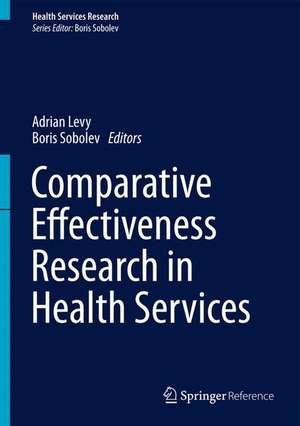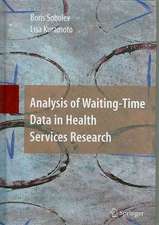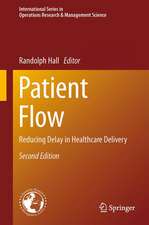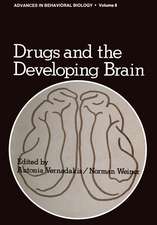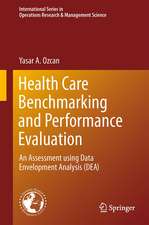Comparative Effectiveness Research in Health Services: Health Services Research
Editat de Adrian Levy, Boris Soboleven Limba Engleză Hardback – 22 mar 2016
The second volume in the Health Services Research series provides a series of perspectives on comparative effectiveness research. Motivated by concern from the general public, governments in virtually all countries with developed and rapidly developing economies have been actively seeking and promoting ways of improving the patient experience of health care, improving the health of populations, and reducing the per capita cost of health care. While comparing treatment outcomes is not a new concept, appreciation of its potential application has grown in recent years. In addition to traditional health sciences methods, modern approaches to comparative effectiveness research now include greater emphasis on social sciences frameworks such as economics, ethics, and implementation science. Moreover, a key feature of the modern approach to comparing treatment outcomes is a focus on the individual patient through explicit consideration of inter-patient variability and patient-reported outcomes.
Comparative Effectiveness Research presents a series of chapters of relevance including introductions to areas that are being incorporated when comparing treatments, country-specific applications, patient-centred approaches, and modern methods. Included are chapters on the following areas that are being considered in treatment comparisons: ethics, economics and costs, implementation science, modern payment schemes (coverage with evidence development), and priority setting. Country-specific examples include an overview chapter on national approaches from various countries in Europe, Australia, and Canada, as well as specific chapters on comparative effectiveness research in Brazil and in the United States. The focus on the individual patient is described through chapters on patient-centred comparative effectiveness research, individualized treatment, the link with personalized medicine, and incorporating patient and public inputfor treatment. Methodological chapters include overviews of data sources, study designs, new statistical methods of combining results, the link with evidence-based medicine, specific issues when comparing drug and non-drug technologies, and dissemination of results.
Preț: 1436.21 lei
Preț vechi: 1511.80 lei
-5% Nou
Puncte Express: 2154
Preț estimativ în valută:
274.86€ • 285.89$ • 226.91£
274.86€ • 285.89$ • 226.91£
Carte disponibilă
Livrare economică 24 martie-07 aprilie
Preluare comenzi: 021 569.72.76
Specificații
ISBN-13: 9781489975997
ISBN-10: 1489975993
Pagini: 500
Ilustrații: XIX, 356 p. 15 illus., 12 illus. in color.
Dimensiuni: 178 x 254 x 21 mm
Greutate: 1.08 kg
Ediția:1st ed. 2016
Editura: Springer Us
Colecția Springer
Seria Health Services Research
Locul publicării:New York, NY, United States
ISBN-10: 1489975993
Pagini: 500
Ilustrații: XIX, 356 p. 15 illus., 12 illus. in color.
Dimensiuni: 178 x 254 x 21 mm
Greutate: 1.08 kg
Ediția:1st ed. 2016
Editura: Springer Us
Colecția Springer
Seria Health Services Research
Locul publicării:New York, NY, United States
Public țintă
ResearchCuprins
Applications of Comparative Effectiveness Research.- Comparative Effectiveness Research and Health Reform in the USA.- Comparative Effectiveness Research and Priority Setting.- Comparative Effectiveness Research in Developing Countries: Example of Brazil.- Comparative Effectiveness Research in Health Technology Assessment.- Comparative Effectiveness Research: Overview.- Comparing Drug and Non-Drug Technologies in Comparative Effectiveness Research.- Costs in Comparative Effectiveness Research.- Coverage with Evidence Development in Comparative Effectiveness Research.- Dissemination of Comparative Effectiveness Research.- Ethical Frameworks and Comparative Effectiveness Research.- Evidence-Based Medicine and Comparative Effectiveness Research.- Implementation Science and Comparative Effectiveness Research.- Incorporating Patient and Public Input for Treatment in Comparative Effectiveness Research.- Indirect Comparisons and Network Meta-Analysis in Comparative Effectiveness Research.-Individualization of Treatment and Comparative Effectiveness Research.- Innovation and Comparative Effectiveness Research.- National Approaches to Comparative Effectiveness Research.- New Statistical Methods of Combining Results in Comparative Effectiveness Research.- Patient-Centred Comparative Effectiveness Research.- Sources of Data for Comparative Effectiveness Research.- Systematic Reviews and Meta-Analysis in Comparative Effectiveness Research.- Traditional and Innovative Study Designs in Comparative Effectiveness Research.
Recenzii
“The book … presents perspectives on CER across 356 pages and 20 chapters and best serves as a reference book for individuals seeking standalone essays that discuss various aspects of CER. … the book provides a comprehensive collection of topics that are relevant for students and professionals wishing to understand CER. … Comparative Effectiveness Research in Health Services provides a solid foundation for learning a significant amount about one of the most important methodologies in health care decision making today.” (Jonathan M. Tan, Jack O. Wasey and Allan F. Simpao, Anestesia & Analgesia, Vol. 125 (6), December, 2017)
Notă biografică
Boris Sobolev, MSc, PhD, is a senior scientist at the Center for Clinical Epidemiology and Evaluation and a faculty member at the University of British Columbia (UBC) School of Population and Public Health in Vancouver, Canada. Since 2003, he is a Canada Research Chair in Statistics and Modeling for Health Care. In 2004-2005, Prof. Sobolev was a Peter Wall Early Career Scholar, and currently he is a Faculty Associate at the UBC Peter Wall Institute for Advanced Studies serving on its Adjudication Committee.
Adrian Levy, PhD, is professor of epidemiology and health services research working at Dalhousie University in Halifax, Nova Scotia, Canada. He commenced his academic career working for the Quebec Council for Health Technology Assessment doing applied health research on real world use of health technologies. Dr. Levy is also the nominated principal investigator for the Maritime Strategy for Patient Oriented Research SUPPORT Unit. This initiative, co-funded by the Canadian Institutes of Health Research, offers research infrastructure designed to promote patient-centred outcomes and health services research in Canada’s three Maritime provinces. The central goals include advancing research on health systems, knowledge translation and implementation of healthcare transformation, and implementing research at the point of care.
Caracteristici
Collates current thinking on how best to deliver health care from multiple disciplines Familiarizes readers with core concepts & theories of health services, including data types Presents a timely summation of the entire field of health services research Represents the work of leading international authors, editors & advisory board experts Includes supplementary material: sn.pub/extras
